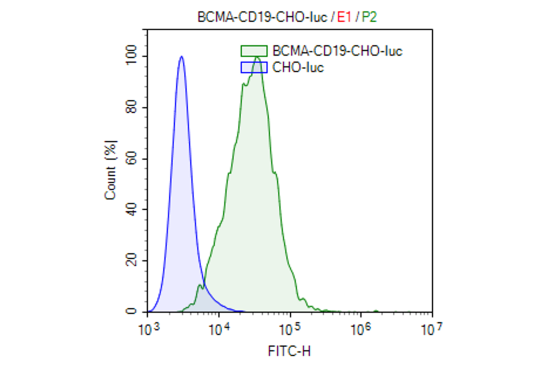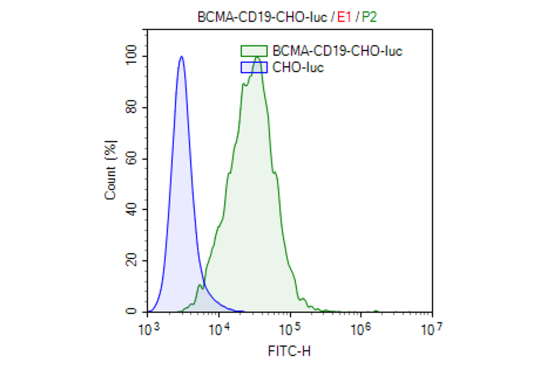CD19 / BCMA / Firefly Luciferase - CHO Recombinant Cell Line
Recombinant clonal stable CHO cell line constitutively expressing full length human CD19 protein (also known as B4 or CVID3, Genbank #NM_001770), human BCMA protein (B-Cell Maturation Antigen or CD269, GenBank accession #NM_001192) and the firefly luciferase. Surface expression of CD19 and BCMA were confirmed by flow cytometry.
Purchase of this cell line is for research purposes only; commercial use requires a separate license. View the full terms and conditions.
• Thaw Medium 3 (BPS Bioscience, #60186)
• Growth Medium 3K (BPS Bioscience, #78041)
• 96-well tissue culture-treated white clear-bottom assay plate
• ONE-Step luciferase assay system (BPS Bioscience, #60690) or other luciferase reagents for measuring firefly luciferase activity
• Luminometer
This cell line has been screened using PlasmoTest™ - Mycoplasma Detection Kit (InvivoGen #rep-pt1) to confirm the absence of Mycoplasma species.
B-lymphocyte antigen CD19 (Cluster of Differentiation 19), also known as B-Lymphocyte Surface Antigen B4 and CVID3, is a transmembrane protein expressed in follicular dendritic cells and all B lineage cells except plasma cells. CD19 plays two major roles in human B cells. It acts as an adaptor protein to recruit cytoplasmic signaling proteins to the membrane and it works within the CD19/CD21 complex to decrease the threshold for B cell receptor signaling pathways. Due to its presence on all B cells, it is a biomarker for B lymphocyte development and lymphoma diagnosis and can be used as a target for leukemia immunotherapies. CD19-targeted therapies based on T cells that express CD19-specific chimeric antigen receptors (CARs) have been utilized for their antitumor abilities in patients with CD19+ lymphoma and leukemia, such as Non-Hodgkins Lymphoma (NHL), CLL and ALL.
B-Cell Maturation Antigen (BCMA), also known as CD269, is a cell surface receptor of the TNF receptor superfamily that recognizes B-Cell Activating Factor (BAFF). BCMA is preferentially expressed on mature B-lymphocytes and Multiple Myeloma (MM) cells. BCMA is a highly attractive target antigen for immunotherapy, not only because of its restricted expression in nonmalignant tissue, but also due to its almost universal expression on MM cells. Pre-clinical studies using CAR (Chimeric Antigen Receptor) T-cells targeting BCMA have demonstrated anti-MM activity, and in 2017, the FDA granted BCMA CAR T-Cell immunotherapy the breakthrough designation in treating Multiple Myeloma.
1. Kang, L., et al. 2020. Characterization of novel dual tandem CD19/BCMA chimeric antigen receptor T cells to potentially treat multiple myeloma. Biomark Res. (8):14
2. D’Agostino, M., et al. 2020. Anti-BCMA CAR T-cell therapy in multiple myeloma: can we do better? Leukemia 34:21-34.
3. Sadelain, M. 2017. CD19 CAR T Cells. Cell 171(7):1471




